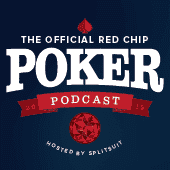This week, James “SplitSuit” Sweeney is in conversation with Matt “Dirty Moose” Greco, a true member of our Red Chipper community and all-around great guy. Greco is currently focused primarily on hand reading, and this podcast follows suit.
Greco has been playing online recently to help hone his skills and stay frosty during the frequent times he’s unable to make the long trip to the poker room. We caught up with him to discuss where he’s at in his game, and how our whole poker community could learn from his experience.

Greco Intro
SplitSuit starts out with introductions: Greco is a $1/$2 and $2/$5 player hailing from New York. He mostly plays Atlantic City, Parx or east coast live rooms. He’s been grinding a little bit on America’s Card Room (ACR). He’s been playing poker for 10+ years, and started out playing limit, “which was awesome because people were terrible at it.”
He describes fading away from poker and the “easy game” of limit, and coming back to find limit poker “basically dead”, except for one or two games at Borgata.
He knew he had to transition to no limit, and took the plunge without looking back. With the “local” card rooms hours of driving from his New York location, you’ll often find Greco at a buddy’s home game, or more recently on ACR grinding the online tables.
Transitioning from Live to Online
Greco admits online poker can be “boring, to be honest.”
“I’ve never been a professional player. For me, poker’s always been a recreational thing. I really enjoy the social part of the game. It’s a lot of fun to talk to people and be amongst people who are into doing what you’re doing,” he says.
At the same time, Greco points out that because you get to see such an exponentially larger number of hands, the value of playing online poker is difficult to understate.
Greco is using online poker “mostly as a study tool.” Not the least of reasons being that the legality of poker in states like New York is still grey and murky, as many ‘Black Friday’ warriors who had money stuck on shutdown sites can empathize with.
Areas of Study
Greco has been working with SplitSuit’s Hand Reading Lab, which has been hailed by him and others as a major work in modern poker strategy. It certainly is epic, with over 7 hours of content, and Greco talks about his study process: He watches one or two videos per day and takes notes, and then goes back to the video again to absorb the rest and take even more notes.
He talks about doing the first Hand Reading Lab exercise and quickly realized he needed to rethink hand ranging from the ground up. Certain ranges he was assigning himself seemed obviously too wide, while others seemed too snug.
He’s been focusing on steal situations online, trying to develop situations where he can both steal more, and save money by stealing less. Online, he’s using a HUD — and points out that SplitSuit is trying to “turn us into human HUDs” — and he’s noticing how often they take aggressive lines. He’s looking specifically at 3-bet percentage, and generally how tight they are (VPIP). If they 3-bet, he’s always looking at 4-bet stats. As SplitSuit says, it’s often hard to get a relevant sample size. SplitSuit also recommends Fold vs. Steal and Fold vs. C-Bet HUD stats for increasing stealing efficiency.
“Especially when you have position, if [your opponent] is folding vs. c-bets more than 70% of the time — another green light to pretty much go crazy there a huge percentage of the time. They probably have a frequency issue and they’re not going to pick up on your frequency issue… you’re c-betting 100%” SplitSuit advises.
Range Editing
Greco talks about working through SplitSuit’s Hand Reading Lab and doing the first exercise of noting down his open ranges. This is something that any poker player can do, and really offers a ton of insight into how you’re playing. He sent it over to Steve “ChipXtractor” Catterson (another awesome Red Chipper who was featured on an earlier podcast). ChipXtractor wrote back judiciously: “All I’m gonna say is that I’m tighter in every spot.”
As a result, Greco has adjusted his game to be tighter overall, and looser in very specific late-position spots. He has noticed this leads to easier decisions.
Out of Position Play
Greco also shouts out coach Christian Soto’s “OOP as the Preflop Raiser PRO video with Gareth James.
“If you’re facing aggression… a lot of the times, in live games, they have it,” Greco says. “I know it’s kind of vague, but aggression in a live game… they just don’t bluff enough.”
SplitSuit adds: “They are very tight when they continue. Yeah, they don’t bluff a ton, but are there still things in their range that they would bet-fold because it’s not ‘nuttish’ enough for them”
Full Ring vs. 6-Max Online
Greco talks about getting inspired by a SplitSuit post in the forum to go after 6-max, and finding it much more challenging that full ring due to the dialed-up aggression. SplitSuit points out that while the Hand Reading Lab examples were built around full ring, they are definitely applicable to 6-max if one takes into account wider ranges, different showdown value perceptions, etc.
Done with Hand Reading?
SplitSuit asks when Greco will feel like he’s “done with hand reading” and ready to move onto another area of study. Greco suggests that hand reading is a lifelong pursuit, especially in live poker: “I think it’s the essence of the game. It’s ever-evolving. It never stops,” he says. “To me, it’s the biggest part of the game, especially in live poker.” SplitSuit agrees.
Turning Into a Human HUD
Greco talks about how concepts while studying are fairly easy to understand, the real challenge comes in their implementation. Live poker, with its many distractions, makes strategy implementation a tall order. Greco advises one should start small. Start with the person to your left. Figure them out. Then step on to the next one until the whole table is covered. This keeps things manageable.
“You look for the people who are going to give you money,” is what Greco says.
SplitSuit asks about how Greco hand reads vs. fish.
“Did they limp or did they raise?”, is Greco’s first question.
“A lot fish like to limp with any two cards and hit the jackpot,” is his observation, to which SplitSuit agrees.
Raising, on the other hand, is a horse of a different color. “If they’re really passive, and they raise pre-flop, chances are they’ve got a decent hand,” Greco says.
Post-Flop Process
The two discuss post-flop and taking into account varying board textures. Greco operates on the assumption that most bad players at the table are going to play aggressively when they have good hands, passively with lesser hands — in other words, very predictably.
SplitSuit recommends keeping an eye out for getting thinner and thinner value on turns and rivers. The player that is maximizing their winnings in these games has to cut this edge razor-thin to optimize their win rate. It can and has been done, so you should at least start incorporating it into your game.
Versus better players, SplitSuit suggests considering check-raising more flops and 3-betting more turns. TAGs and good LAGs are going to have lots of moves in their arsenal, trumping them with a calculated and aggressive move is one way to shut them down. Greco admits this area is an advanced area for where he’s at in study, and SplitSuit agrees that his effort is better spent on maximizing value from fish. At the same time, he encourages Greco to get involved more with TAGs to find ways to exploit their tendency to play predictably.
“When you’re playing against TAGs,” SplitSuit explains, “there are going to be less showdowns, so you have more opportunities to just start blasting away, picking up situations where you can pick up pots 3-betting preflop with rags. You hand read them well… and then you take advantage with a lite 3-bet.”
Greco concurs: “A lot of dead money.”
On Deck
SplitSuit moves to wrap up the podcast with a question about what Greco plans on studying next. Having a waypoint to navigate to is always helpful in one’s journey toward becoming more knowledgable and experienced.
Greco mentions wanting to work on mental game, not necessarily tilt, but on maintaining A-game.
“Flow? Is that what the cool kids are calling it?”, he jokes.
SplitSuit points out the nice thing about developing ‘flow’ is that you can work on it at any time, on or off the table.
Thanks again to Greco for being so open about his game and helping our community learn more about how to improve theirs. If you’re interested on working on the same hand reading exercises that Greco was working on in this episode, visit the Hand Reading Lab page now and use the code from this week’s podcast to download SplitSuit’s Playing vs. Unknowns webinar free.


I’ve seen this recommendation to start with the player on your left before and I’m still confused by it. Everyone seems to agree that the money moves clockwise. So why don’t we want to start with the player to our right and move in THAT direction?
When we are in good position and more likely to be interested in participating in a pot, they are in decent position, too, and will have their widest and most exploitable ranges, right?
So why would I want to study them last?
Thanks in advance.
It’s not that you study them last. I focus more on the players to my left when I’m in a game where stealing is possible (not usually the case in low limit live games) – but otherwise I just focus on everyone equally. The tougher the player, the more I focus on them. The nittier they are, the less attention I give them since they are involved in less pots that I enter.
Matt and James,
Very much enjoyed the discussion. Going to have to go back and re-listen a few times… Quite a few nuggets of great info hidden in this podcast. Thanks guys. Great job.
Steve C. (cXt)
Thanks Steve!
I have been listening to this podcast for about 6 months now and I have to say that it appears to me that this is one of the BEST podcasts running! The information within the discussions are right on point and are areas that all serious poker players can relate to and benefit from. James and his cast of pros have helped me tremendously to realize that I have many leaks in my game that I will need to work seriously on before I can be consistent in poker.
This podcast is yet another example of the knowledge that an average to above average player cannot afford to overlook. Thanks James and crew for all of the time and energy that you spend to help ok players become excellent players! I will be purchasing the hand reading lab very soon!
You are super welcome Allen and I’m so glad to hear the podcast is helping you exactly where you are in your game. Keep up the hardwork and make sure to let us know in the forum how things are progressing for you =)
I like the simplicity of the podcasts more than anything nice and slow. Only playing for 18 months but learned alot . I was wondering if instead of putting a player on range with two cards how bout just 1 to start for beginners?
Thanks Brian! Trying to pin-point a single hand within a range is not a great idea. Yes, hand reading requires work…but it’s work that benefits you over the duration of your poker career.